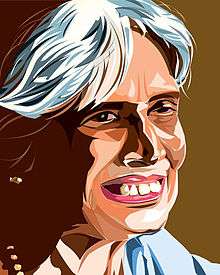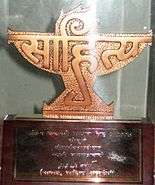Balamani Amma
Nalapat Balamani Amma (19 July 1909 – 29 September 2004) was an Indian poet who wrote in Malayalam. She was a prolific writer and was known as the "poetess of motherhood". Amma (Mother), Muthassi (Grandmother), and Mazhuvinte Katha (The story of the Axe) were some of her well-known works.[1] She was a recipient of many awards and honours, including the Padma Bhushan,[2] Saraswati Samman, Sahitya Akademi Award, and Ezhuthachan Award.[3] She was the mother of the renowned writer Kamala Surayya.[4]
Balamani Amma | |
|---|---|
 | |
| Born | 19 July 1909 Punnayurkulam, Malabar District, Madras Presidency, India |
| Died | 29 September 2004 (aged 95) Kochi, Kerala, India |
| Occupation | Poet |
| Genre | Poetry |
| Notable awards | Padma Bhushan, Sahitya Akademi Award, Saraswati Samman, Asan Prize, Ezhuthachan Award |
| Spouse | V. M. Nair |
| Children | Kamala Surayya, Sulochana, Mohandas, Shyam Sunder |
Biography
Balamani Amma was born on 19 July 1909 to Chittanjoor Kunhunni Raja and Nalapat Kochukutti amma at Nalappat, her ancestral home in Punnayurkulam of Thrissur district in Kerala. Though she received no formal education, the tutelage under her maternal uncle and the poet Nalapat Narayana Menon and his collection of books helped her become a poet. She was influenced by Nalapat Narayana Menon and the poet Vallathol Narayana Menon.[5]
Balamani Amma was married at the age of 19 to V.M. Nair, who later became the managing director and managing editor of Mathrubhumi, a widely circulated Malayalam newspaper. She left for Kolkata after her marriage to live with her husband, who was employed as a senior officer in the Walford Transport Company that sold Bentley and Rolls Royce automobiles. V.M. Nair died in 1977.
Balamani Amma was the mother of the renowned writer Kamala Surayya, who translated one of her mother's poems, "The Pen", which describes the loneliness of a mother. Mohandas, Shyam Sunder, and Sulochana Nalapat are her other children.
Balamani Amma died on 29 September 2004 after having suffered from Alzheimer's disease for nearly five years.[6]
Poetry
Balamani Amma published more than 20 anthologies of poems, several prose works, and translations. She began writing poems at a young age and her first poem "Kooppukai" was published in 1930.[5] Her first recognition came when she received the Sahithya Nipuna Puraskaram, an award from Parikshith Thampuran, former ruler of Kingdom of Cochin. Nivedyam is the collection of poems of Balamani Amma from 1959 to 1986. Lokantharangalil is an elegy on the death of the poet Nalapat Narayana Menon.[7]
Awards and recognition
Her poetry on the love for children and grandchildren earned her the titles of Amma (mother) and Muthassi (grandmother) of Malayalam poetry.[8] While delivering the Balamaniyamma remembrance speech at the Kerala Sahitya Akademi, Akkitham Achuthan Namboothiri, described her as the "prophet of human glory" and said that her poetry had been an inspiration to him.[9]
She has received many literary honours and awards, including the Kerala Sahithya Akademi Award for Muthassi (1963), Kendra Sahitya Akademi Award for Muthassi (1965), Asan Prize (1989), Vallathol Award (1993), Lalithambika Antharjanam Award (1993), Saraswati Samman for Nivedyam (1995), Ezhuthachan Award (1995), and N. V. Krishna Warrier Award (1997).[7] She was also a recipient of India's third highest civilian honour, the Padma Bhushan, in 1987.[10]
Collections of poems
- Kudumbini (1936)
- Dharmamargathil (1938)
- Sthree Hridayam (1939)
- Prabhankuram (1942)
- Bhavanayil (1942)
- Oonjalinmel (1946)
- Kalikkotta (1949)
- Velichathil (1951)
- Avar Paadunnu (1952)
- Pranamam (1954)
- Lokantharangalil (1955)
- Sopanam (1958)
- Muthassi (1962)
- Mazhuvinte Katha (1966)
- Ambalathilekku (1967)
- Nagarathil (1968)
- Veyilaarumbol (1971)
- Amruthamgamaya (1978)
- Sandhya (1982)
- Nivedyam (1987)
- Mathruhridayam (1988)
- To My Daughter (Malayalam)
- Kulakkadavil
References
- George, K. M. (1998). Western influence on Malayalam language and literature. Sahitya Akademi. p. 132. ISBN 978-81-260-0413-3.
- "Padma Awards" (PDF). Ministry of Home Affairs, Government of India. 2015. Archived from the original (PDF) on 15 November 2014. Retrieved 21 July 2015.
- "Literary Awards". Government of Kerala. Archived from the original on 24 May 2007. Retrieved 13 November 2011.
- Weisbord, Merrily (2010). The Love Queen of Malabar: Memoir of a Friendship with Kamala Das. McGill-Queen's University Press. p. 116. ISBN 978-0-7735-3791-0.
balamani amma.
- Azheekode, Sukumar. "Balamaniamma". Archived from the original on 2 May 2014. Retrieved 13 November 2011.
- "Balamani Amma no more". Indian Express. 30 September 2004. Retrieved 20 November 2011.
- "A prolific writer". The Hindu. 30 September 2004. Retrieved 13 November 2011.
- "Balamaniamma" (in Malayalam). Malayala Manorama. Archived from the original on 28 January 2013. Retrieved 20 November 2011.
- "Balamaniyamma remembered". The Hindu. 8 October 2004. Retrieved 20 November 2011.
- "Padma Bhushan Awardees". Government of India. Retrieved 13 November 2011.
External links
| Wikimedia Commons has media related to Balamani Amma. |
